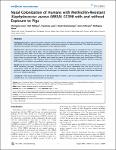Nasal Colonization of Humans with Methicillin-Resistant Staphylococcus aureus (MRSA) CC398 with and without Exposure to Pigs
Cuny, Christiane
Nathaus, Rolf
Layer, Franziska
Strommenger, Birgit
Witte, Wolfgang
Altmann, Doris
Background: Studies in several European countries and in North America revealed a frequent nasal colonization of livestock with MRSA CC398 and also in humans with direct professional exposure to colonized animals. The study presented here addresses the question of further transmission to non exposed humans. Methods: After selecting 47 farms with colonized pigs in different regions of Germany we sampled the nares of 113 humans working daily with pigs and of their 116 non exposed family members. The same was performed in 18 veterinarians attending pig farms and in 44 of their non exposed family members. For investigating transmission beyond families we samples the nares of 462 pupils attending a secondary school in a high density pig farming area. MRSA were detected by direct culture on selective agar. The isolates were typed by means of spa-sequence typing and classification of SCCmec elements. For attribution of spa sequence types to clonal lineages as defined by multi locus sequence typing we used the BURP algorithm. Antibiotic susceptibility testing was performed by microbroth dilution assay. Results: At the farms investigated 86% of humans exposed and only 4.3% of their family members were found to carry MRSA exhibiting spa-types corresponding to clonal complex CC398. Nasal colonization was also found in 45% of veterinarians caring for pig farms and in 9% of their non exposed family members. Multivariate analysis revealed that antibiotic usage prior to sampling beard no risk with respect to colonization. From 462 pupils only 3 were found colonized, all 3 were living on pig farms. Conclusion: These results indicate that so far the dissemination of MRSA CC398 to non exposed humans is infrequent and probably does not reach beyond familial communities.
Files in this item
No license information

